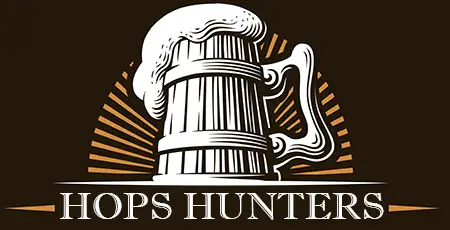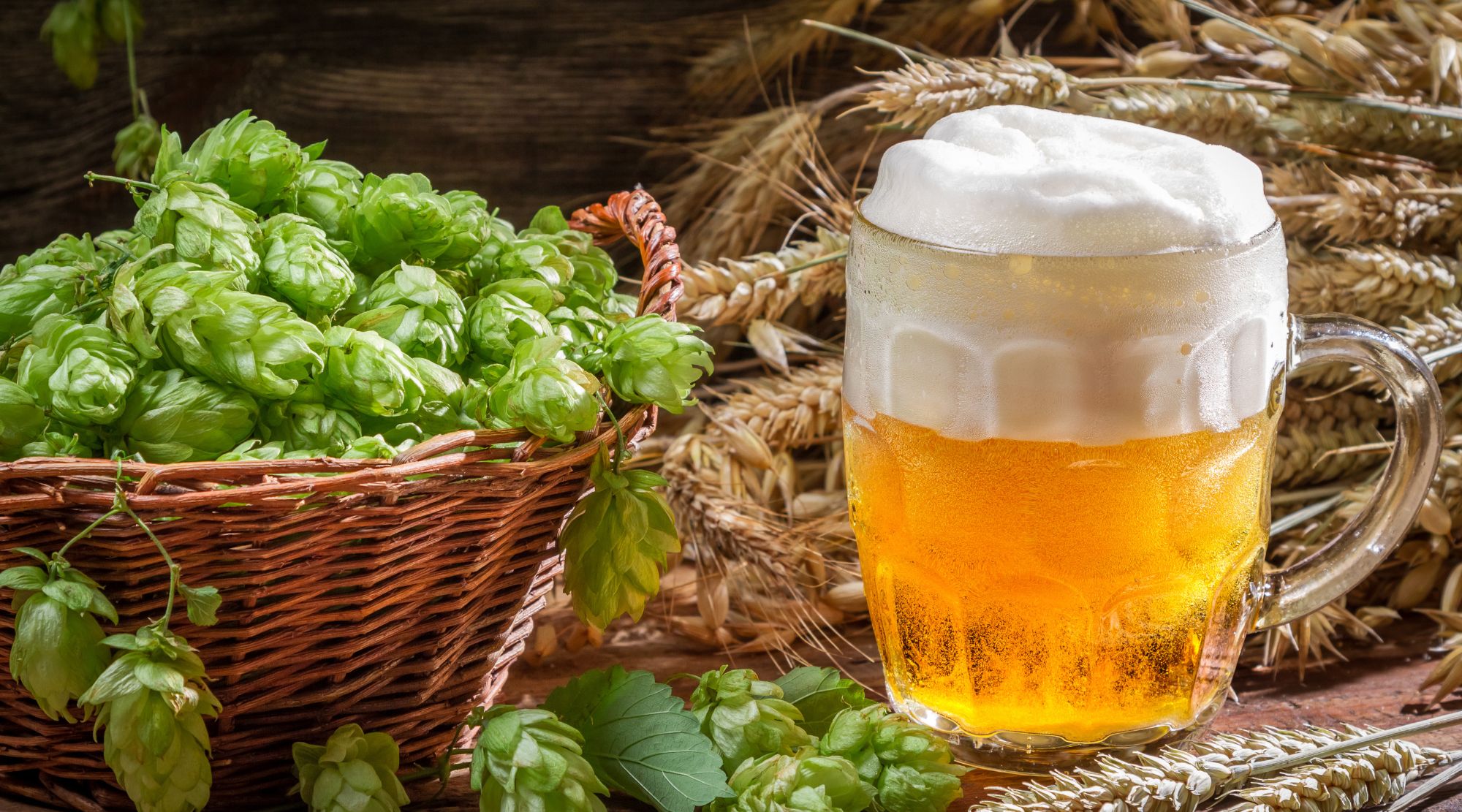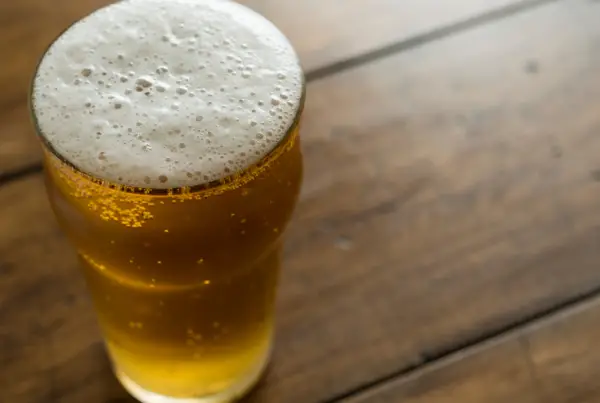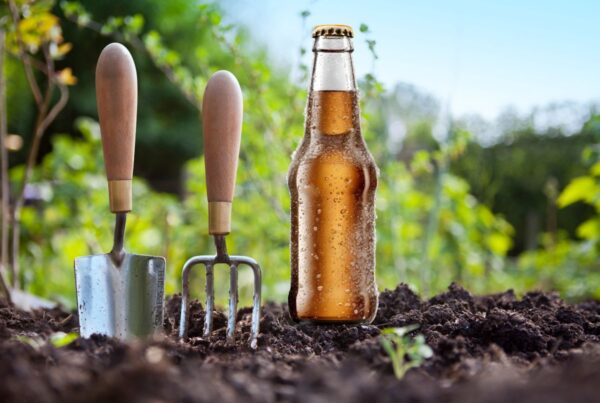The Three Main Types of Hops in Beer
Bitter Hops
You know that bitter “bite” you get from a good IPA? You can thank the aptly-named bitter hops. They’re there to balance out the malt, make sure things don’t get too saccharine, and basically keep sweetness in check so your brew doesn’t veer off into candyland.
Bitter hops step into the brewing process early. They’re boiled for longer, and in that time, the heat causes them to release “bittering compounds.” These compounds include alpha acids (sometimes seen printed as α acids), of which there are many kinds, but 5 of the main ones are:
- Humulone
- Cohumulone
- Adhumulone
- Posthumulone (Not to be confused with the decidedly unbitter Postmalone)
- Prehumulone
While beta acids in hops actually pack a stronger bitter punch than alpha acids, chemically, they don’t dissolve well. Because of this, they don’t contribute much to a beer’s overall bitterness. It’s kind of like having a super loud speaker, but it’s encased in a sound-proof box. Even though it’s blaring, not much sound is getting out. Similarly, even though beta acids are intensely bitter, their poor solubility means they don’t make much of an impact on the flavor of your beer.
Many people think all bitter hops are the same, but that couldn’t be further from the truth—good breweries can pretty much create a bitterness profile that’s as unique as a fingerprint.
There’s everything from the Columbus hop (AKA Tomahawk hop)—which also moonlights as an aroma hop—to the German Magnum hop, known for its “clean” bitterness* and mild, background fragrance. You have the Galena hop, a high alpha acid hop that’s all about bold, clean bitterness, and the Chinook hop that couples moderate bitterness with a spicy, piney aroma.
*Clean bitterness: In beer, this means the bitter flavor is sharp, straightforward, and doesn’t linger on the palate. It’s crisp, without adding any astringent or otherwise off-putting flavors that can sometimes accompany intense bitterness.
Aroma Hops
As you’d guess, the primary use of these is to add more complexity to a beer’s aroma. And each aroma hop variety offers a unique profile—floral, citrusy, earthy, spicy, etc.. They come in towards the end of the brewing process.
Just like their bitter relatives, aroma hops come in a dizzying array. There’s the citrusy Centennial hop, often found in American ales, and the spicy, earthy, very-British-sounding Fuggle hop, a favorite in English brews.
Flavor Hops
Despite the name, flavor hops actually have their fingers in all the pies—bitterness, aroma, and flavor. They’re usually added midway through the brewing process, between their bitter and aroma counterparts.
Something interesting about these hops is that they have natural antimicrobial properties that can help to extend the shelf life of the beer they’re used in.
Back in the age of sail—a phrase I’ve always wanted to use—British brewers would add extra hops to the beer destined for their troops in India. This famously led to the birth of the India Pale Ale; the additional hops helped keep the beer fresh during its long voyages across the globe. Basically, they were the original beer preservatives before pasteurization and refrigeration were a thing.
Like the other hop types, flavor hops have many varieties. For example, there’s the piney, citrusy Chinook hop, used in a number of American brews, and the lemony, herbal Sorachi Ace hop, a Japanese variety of hop that was originally developed for Sapporo, but has found a home in several different beer styles (notably, Brooklyn Brewing Company’s Saison).
Common Varieties of Hops and Their Characteristics
- Cascade: Citrusy, floral, grapefruit.
- Centennial: Floral, citrusy, medium intensity.
- Chinook: Piney, spicy, grapefruit.
- Citra: Tropical, citrusy, peachy.
- Columbus: Earthy, herbal, pungent.
- Fuggle: Earthy, woody, mild.
- Galaxy: Tropical, citrusy, passionfruit.
- Goldings: Sweet, floral, mild.
- Hallertau: Floral, spicy, herbal.
- Magnum: Clean bitterness, faint fruit, herbal.
- Mosaic: Tropical, berry, herbal.
- Nelson Sauvin: Fruity, white wine, fresh crushed gooseberries.
- Nugget: Herbal, peachy, woodsy.
- Saaz: Spicy, herbal, earthy.
- Simcoe: Piney, citrusy, earthy.
- Sorachi Ace: Lemony, herbal, coriander, dill-like.
- Warrior: Mild, resinous, herbal.
- Willamette: Fruity, floral, earthy.
- Zeus: Pungent, citrusy, earthy.
The Final Pour
Now obviously, it’s not just a case of throwing hops into the mix willy-nilly (well… maybe for certain craft brewers). The type of beer being brewed determines the hop schedule—that is, when and how much of each hop is added.
A hop-forward beer like an IPA will have a heavy dose of bitter hops, while a more aromatic beer will (usually) lean more on aroma hops. As with most things, the key is finding just the right balance.
In some cases, a brewer might stick to just one hop variety to create a single-hop beer to showcase just the characteristics of that specific hop. This is known as a “SMaSH” beer, which stands for Single Malt and Single Hop. On the other end of the spectrum, there are beers that utilize 10 or even more types of hops.
We’ve jumped around between the three main kinds of hops, and got introduced to some of the most common hop varieties and their flavors/characteristics—but that’s just scratching the surface. If your curiosity is brewing and you’re thirsting for more, head to Hops Hunters to learn more about different types of beer!






